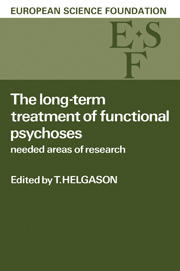Book contents
- Frontmatter
- Contents
- List of Participants
- Introduction
- I Organisational Aspects of Long-term Treatment
- II Patients Aspects of Long-term Treatment
- III Public Health Aspectsof Long-term Treatment
- Introduction to public health aspects of chronic illness and long-term treatment
- Evaluation of long-term community care for patients with schizophrenia
- Case registers for monitoring treatment outcome in chronic functional psychoses
- Socialdisabilityand chronicmentaldisorder
- The neglect of the patient with chronic functional psychosis: the need for further research
- Suicidesand functional psychoses
- Interaction with families
- Cost-effectiveness analysis
- Consumption of services-European aspects
- Index
Socialdisabilityand chronicmentaldisorder
from III - Public Health Aspectsof Long-term Treatment
- Frontmatter
- Contents
- List of Participants
- Introduction
- I Organisational Aspects of Long-term Treatment
- II Patients Aspects of Long-term Treatment
- III Public Health Aspectsof Long-term Treatment
- Introduction to public health aspects of chronic illness and long-term treatment
- Evaluation of long-term community care for patients with schizophrenia
- Case registers for monitoring treatment outcome in chronic functional psychoses
- Socialdisabilityand chronicmentaldisorder
- The neglect of the patient with chronic functional psychosis: the need for further research
- Suicidesand functional psychoses
- Interaction with families
- Cost-effectiveness analysis
- Consumption of services-European aspects
- Index
Summary
Introduction
Chronic disability is a common feature of serious mental illness. Its relationship with psychopathology, particularly in terms of the nature and gravity of symptoms as assessed with the aid of diagnostic interviews and classified with systems like ICD-9 or DSM-III, has not yet been adequately established.
The ability to assess precisely the nature and consequences of chronic disability is becoming more urgent because of the trend towards avoiding long-term hospitalization. In a recent longitudinal investigation in Groningen, under the umbrella of the ‘WHO Collaborative Study on the Assessment and Reduction of Psychiatric Disability’ (Jablensky, Schwarz & Tomov, 1980) we followed a group of people over a period of 3 years. This comprised patients who, for the first time in their lives, manifested symptoms of non-affective functional psychosis (Wiersma et al., 1984b). It appeared that those with non-remitting or frequently recurring psychosis had, on average, spent less than 40% of their time in hospital. This was, in fact, somewhat less than people with a few limited psychotic episodes. In Fig. 1, each dot represents a patient in one of the subgroups with a particular course of psychosis during the first 3 years after the onset of the illness. The solid line connects the average percentage of time spent in hospital by the various subgroups. The broken line represents the same for any type of care. To give an example, the figure shows that nine patients in the two categories with the worst course (IVa and IVb) spent less than 20% of the period in hospital. This could be considered a satisfactory situation, but it was also found that the course taken by their disability was anything but favourable. The development of social disability did not parallel that of symptomatology. For the same subgroups, Fig. 2 illustrates the manner in which the disability developed over 3 years. Disability was measured using the Disability Assessment Schedule (Jablensky et al., 1980) and counted as the sum of the scores on the individual sections. In subgroup Ib. the deterioration of functioning, despite the complete remission of symptoms after the psychotic episodes, is remarkable.
These findings stress the need for an assessment of disability independent from that of psychopathology in order to direct social rehabilitation, particularly for people suffering from chronic psychosis (though not limited to that group).
- Type
- Chapter
- Information
- The Long-Term Treatment of Functional PsychosesNeeded Areas of Research, pp. 207 - 216Publisher: Cambridge University PressPrint publication year: 1985



